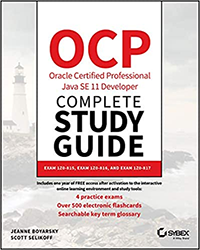
Update (11/05/2020): Read The 1Z0-819 Exam page to learn how you can easily our Java 11 Study Guides to prepare for Oracle’s 1Z0-819 Exam, as well as the 1Z0-817 Upgrade Exam.
Jeanne and I are thrilled to announce that we are releasing Java 11 OCP books early next year. Yes, you heard that right, books plural, as in more than one! In fact, we’ll be releasing two new books, along with a complete set edition.
- Java OCP 11 Programmer I Study Guide 1Z0-815
- Java OCP 11 Programmer II Study Guide 1Z0-816
- Java OCP 11 Developer Complete Study Guide
We’ll post links where you can preorder the books as soon as they are available!
These books have been carefully written and include the most important information you need to know for the Java 11 OCP exams. While we are quite proud of our Java 8 books, there’s a lot of new material required for the exams including modules, var, and custom annotations just to name a few.
If you’re thinking of taking the new exams prior to the books’ release, we recommend reading our posts detailing our experiences taking the exams:
In short, if you’re comparing the first exam (1Z0-815) to the older OCA 8 (1Z0-808) exam, don’t. They are quite different and the difficulty level has definitely been increased. We expect both books to be available in early 2020. In fact, we’re nearly done writing the first book already!

